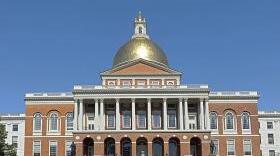It has become an annual lament during post-election analysis: most Americans don’t vote. Now, one New York State Assemblyman thinks it’s time to change the election process itself, urging his fellow lawmakers to allow some form of early voting.
Democratic Assemblyman Kevin Cahill is one of several co-sponsors of a bill to allow early voting in New York.
“Any steps we could take, incremental or revolutionary, to improve voter participation are where we ought to be right now,” says Cahill.
The bill would create an early voting system for primary, general, and special races for public office in New York. Cahill says counties would be responsible for designating extra polling places to be open for nearly two weeks before an election. Although the Assembly has passed the bill over the last two years, the Senate remains opposed. Cahill says the abysmal voter turnout in the November 4 elections should serve as a wakeup call.
“New York State ranked fourth from last in voter participation. One out of three people decided that it was worth their time to go vote. Two out of three people stayed at home,” Cahill says. “Winners, overwhelming, landslide winners who got 66 percent of the vote really got 20 percent of the electorate supporting them. That’s not democracy. It’s time to change it.”
One of those landslide winners was East Fishkill Republican Assemblyman Kieran Lalor. He voted against the bill and opposes any form of early voting.
“There are studies, one from the University of Wisconsin, which says that you actually lower voter turnout with early voting. And the reason for that is, everybody is or most people are tuned in on Election Day, and people are coming into work saying, I voted this morning or I’m going to vote this afternoon, and they’re all talking about it and there’s a buzz about it. And people are wearing stickers that say, I just voted,” says Lalor. “If you drag it out over the long term, you lose that buzz and that excitement. “It’s kind of like, to use a sports analogy, it’s kind of like the reason the Super Bowl gets a better rating than the World Series is the Super Bowl is a single day and the World Series is spread out over seven games, in some cases.”
He says any additional cost for early voting would be an unfunded mandate.
“We are spending money to lower voter turnout,” says Lalor. “That’s 0 for 2 in my book.”
Cahill, of Kingston, weighs in on cost.
“It’s always been my opinion that there’s one place where we ought not be scrimping, and that’s on democracy. First of all, the cost is not enormous. The cost is miniscule compared to what’s at stake. And, secondly, economies can be brought to bear by centralizing polling places so that people can vote in advance and there really is, who even knows whether there’s any additional cost involved in introducing some of the forms of electronic voting,” says Cahill. “So that’s a red herring people are using. Democracy is not free, democracy is not cheap, but it’s worth every penny.”
Jacob Soboroff is board member of Why Tuesday? a non-profit, non-partisan organization founded in 2005 to find solutions to increase voter turnout and participation in elections.
“At this point, it is incredibly backwards to have a system like that,” says Soboroff. “The original reason that voting was set on Tuesday in 1845 was to make it convenient, ironically, for people to travel by horse and buggy, and now it’s one of the most inconvenient days of the week.
He says having one weekday for voting does not fit modern lives.
“The people that don’t go out and vote currently are not Republicans and they’re not Democrats, they’re working-class people. They’re single mothers and fathers that have to take care of the kids. They’re students that have long hours in class and can’t get out in time because they can only vote on Tuesday. They’re people, like many people I know, that have to work more than one job, maybe two, maybe three because they can’t make ends meet in their own life,” Soboroff says. “And New York is one of only 14 states in the country that doesn’t have some form of early or what’s called no excuse absentee voting where you can vote on a day other than Tuesday.”
Cahill also supports one idea by Democratic New York Congressman Steve Israel, who is the sponsor of legislation that would turn the first Saturday and Sunday in November into an election weekend for those running for federal office. Cahill argues that a similar plan could work in New York as well.







